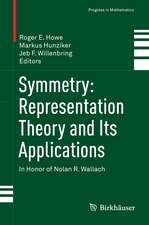Approximation Theory: Moduli of Continuity and Global Smoothness Preservation
Autor George A. Anastassiou, Sorin G. Galen Limba Engleză Hardback – 22 dec 1999
| Toate formatele și edițiile | Preț | Express |
|---|---|---|
| Paperback (1) | 652.49 lei 6-8 săpt. | |
| Birkhäuser Boston – 8 oct 2012 | 652.49 lei 6-8 săpt. | |
| Hardback (1) | 658.37 lei 6-8 săpt. | |
| Birkhäuser Boston – 22 dec 1999 | 658.37 lei 6-8 săpt. |
Preț: 658.37 lei
Preț vechi: 774.55 lei
-15% Nou
Puncte Express: 988
Preț estimativ în valută:
125.100€ • 131.05$ • 104.02£
125.100€ • 131.05$ • 104.02£
Carte tipărită la comandă
Livrare economică 14-28 aprilie
Preluare comenzi: 021 569.72.76
Specificații
ISBN-13: 9780817641511
ISBN-10: 0817641513
Pagini: 540
Ilustrații: XIII, 525 p.
Dimensiuni: 155 x 235 x 34 mm
Greutate: 0.92 kg
Ediția:2000
Editura: Birkhäuser Boston
Colecția Birkhäuser
Locul publicării:Boston, MA, United States
ISBN-10: 0817641513
Pagini: 540
Ilustrații: XIII, 525 p.
Dimensiuni: 155 x 235 x 34 mm
Greutate: 0.92 kg
Ediția:2000
Editura: Birkhäuser Boston
Colecția Birkhäuser
Locul publicării:Boston, MA, United States
Public țintă
ResearchCuprins
1 Introduction.- 1.1 On Chapter 2: Uniform Moduli of Smoothness.- 1.2 On Chapter 3: LP-Moduli of Smoothness, 1 ?pTrigonometric Operators.- 6 Global Smoothness Preservation by Algebraic Interpolation Operators.- 7 Global Smoothness Preservation by General Operators.- 8 Global Smoothness Preservation by Multivariate Operators.- 9 Stochastic Global Smoothness Preservation.- 10 Shift Invariant Univariate Integral Operators.- 11 Shift Invariant Multivariate Integral Operators.- 12 Differentiated Shift Invariant Univariate Integral Operators.- 13 Differentiated Shift Invariant Multivariate Integral Operators.- 14 Generalized Shift Invariant Univariate Integral Operators.- 15 Generalized Shift Invariant Multivariate Integral Operators.- 16 General Theory of Global Smoothness Preservation by Univariate Singular Operators.- 17 General Theory of Global Smoothness Preservation by Multivariate Singular Operators.- 18 Gonska Progress in Global Smoothness Preservation.- 19 Miscellaneous Progress in Global Smoothness Preservation.- 20 Other Applications of the Global Smoothness Preservation Property.- References.- List of Symbols.
Recenzii
"This monograph is an intensive and comprehensive study of the computational aspects of the moduli of smoothness and the Global Smoothness Preservation Property (GSPP)."
---Zentralblatt MATH
"Going over the introduction, the reader will get an almost full account, without proofs, of the results presented in the monograph… There are many questions for further research arising from this interesting book. Some of them are formulated by the authors, but many more may be born in the mind of the reader."
—Zentralblatt Math.
---Zentralblatt MATH
"Going over the introduction, the reader will get an almost full account, without proofs, of the results presented in the monograph… There are many questions for further research arising from this interesting book. Some of them are formulated by the authors, but many more may be born in the mind of the reader."
—Zentralblatt Math.















